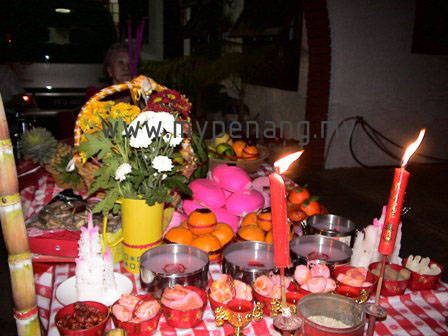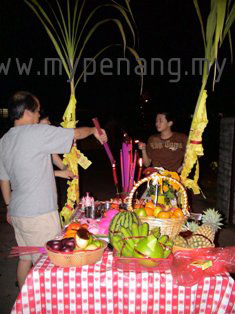The Festival of the Heavenly God or Jade Emperor falls on January or February, which is actually on the 9th day of Chinese New Year (9th day of the Lunar calendar - 8th day past midnight). This cultural and religious festival is one of the most important festival for the Hokkien community in Malaysia

This celebration is both of religious and cultural (Chinese) significance, especially to the Chinese Hokkien communities in Malaysia and Singapore
This festival starts in the early morning of the 9th day of the Chinese lunar calen-dar. The festival marks the birthday of the Jade Emperor (in Hokkien: Th’ nee Kong) and is a very important festival to Chinese Toaists and Buddhists. Though the Jade Emperor is the supreme ruler in Taoism, in Buddhism, he is the Guardian God, Shi-tan, who lives in the centre of the universe.
To the Hokkien community this is a very important festival and is widely celebrated in Penang and the northern part of the peninsular. On the night of the 8th day of the lunar year at about midnight, prayers and food offerings are made at the front entrance of Chinese homes. For the Hokkiens 'a must' offering is the 'kam chia' or sugarcane.
In Penang, you can see this festival celebrated on a grand scale at the Clan Jetties.
Story of the Hokkien clan and prominance of the sugar can plant
During the Song Dynasty (Mongol dynasty) most of the clans in Southern China (Fujian, Henan, Zhejiang) were heavily repressed and lived under great fear of the Mongols. The Hokkien clan were constantly at the mercy of the Mongols who attacked and hunted them, because the Hokkiens are seen a threat to the empire.
The Hokkiens then fled to the Henan province where sugarcane plantations were in abundance. Though many wre killed by the pursuing Mongols, a group of Hokkiens managed to hide themselves among the sugarcane plants. The pursuing Mongols searched the area for days but never located the remaining Hokkiens.
The Mongols eventually gave up and returned to their base. On the ninth day of the Chinese Calendar, the Hokkiens happily emerged from their hideout praising the celestial deities for saving them and believed that the Heavenly God had protected them. Thus, from then on, in all Hokkien celebrations, the sugarcane plant is given special prominence.
That is why the Ninth day is regarded as the day of salvation by the Hokkien community. As offering to the Heavenly God, a pair of sugarcane plants is
usually placed, one on each side of the offering table. The pair symbolises unity, cooperation and strength.



